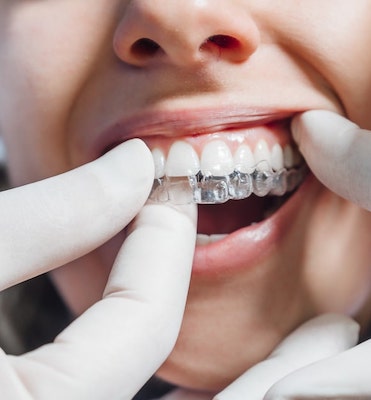
One of the reasons that dental patients have never been excited about the idea of wearing braces is because of the appearance of the metal braces on the teeth. Thankfully, there have been changes to the treatments that give teeth a straighter look and this includes the use of clear aligners that can be worn on the teeth. One of the most popular and best-know clear aligner options is Invisalign which has been around since 1998. In this informative article, the Cosmetic Town News team will examine the changes that can be made with Invisalign along with the type of results patients can expect to enjoy after the treatment. Let’s start off the article with a “Procedure 411” about Invisalign from Cosmetic Town TV:
Invisalign can be described as the brand name for a thin clear aligner that is used by patients seeking to have a specific type of orthodontic treatment. Even though Invisalign is not considered to be a completely invisible treatment option, they are clear in nature and they fit over the teeth in a manner that is less conspicuous than traditional metal braces that are made of brackets and wires.
Invisalign is able to treat a variety of dental issues including:
The first step in having an Invisalign treatment is visiting an orthodontist who will create a 3D image of the jaw and mouth in order to make a plan for moving the teeth into the deaired position. The treatment plan will involve the use of a series of customized plastic aligners that apply pressure to the teeth in order to shift them into the desired place in the mouth in a gradual manner.
The patient will need to switch out one set of clear aligners for the next set at a rate of every week or two. In addition, the patient will need to wear the clear aligners in the mouth for a period of 20 to 22 hours each day. The only time the patient should not be wearing the aligners is when they are eating, brushing their teeth, or cleaning the aligners.
The length of the treatment depends on how much of a desired change needs to be made to the teeth and if the proposed changes also involve complex bite issues or complicated spacing issues.
 Some of the “pros”/benefits of the treatment include:
Some of the “pros”/benefits of the treatment include:
Some of the “cons”/drawbacks of this treatment include:
Even taking these pros and cons into account when deciding whether or not to have the treatment, the final results should be permanent as long as the patient follows the instructions and practices good oral health.
Here are some common questions patients should keep in mind when making the decision to have an Invisalign treatment:
Patients who are interested in having an Invisalign treatment should make sure they are prepared with a list of questions when they schedule a consultation appointment with their dentist. Besides examining the current condition of the teeth, the dentist should also be willing and able to answer any and all questions related to the treatment process. An orthodontist can also answer any questions and examine the current condition of the teeth.
The dental professional will also be able to determine if Invisalign can address the current issues with the teeth or if the use of more traditional metal braces will be needed to achieve the desired results. It is important to know the pros and cons of each treatment option in order to make an educated and informed decision when it comes to the teeth. An educated patient is one who has the necessary information and knowledge to make the choice that will best benefit them when it comes to gaining an improved and straight look to the teeth.
- MA